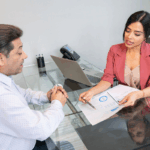Inflammatory Bowel Disease (IBD) refers to a group of chronic inflammatory conditions affecting the gastrointestinal (GI) tract, characterized by episodes of abdominal pain, diarrhea, and other digestive symptoms. The two main types of IBD are Crohn’s Disease, which can affect any part of the GI tract, often causing patchy inflammation through all layers of the bowel wall, and Ulcerative Colitis, which specifically affects the colon and rectum, causing continuous inflammation of the inner lining. Both conditions are autoimmune in nature, and their exact causes remain unclear.
Working while in an IBD flare-up can be challenging, but it’s possible with some adjustments and strategies to manage both your symptoms and your workload.
Here are 10 practical tips to help you stay productive while minimizing the impact of an IBD flare during work:
1. Communicate with Your Employer & Teammates
Be Transparent.
If you feel comfortable, inform your employer or colleagues about your condition. You don’t have to go into great detail, but letting them know that you’re experiencing a flare can help them be more understanding.
Request Flexibility.
Ask for adjustments to your work schedule, such as flexible hours or remote work options, if possible. Some companies may offer additional sick days or the ability to work from home during flare-ups.
Know Your Rights.
Depending on where you live, you may have legal protections under laws like the Americans with Disabilities Act (ADA) in the U.S. or similar laws elsewhere, which require employers to provide reasonable accommodations.
2. Prioritize and Manage Your Tasks
Focus on the Essentials.
During a flare-up, it’s important to prioritize tasks and focus on what’s most critical. Identify your top priorities and try to tackle those first.
Break Tasks into Smaller Steps.
If you’re feeling fatigued or distracted by symptoms, break large tasks into smaller, more manageable steps. This can make work feel less overwhelming.
Delegate When Possible.
If you’re in a team, ask for help with non-essential tasks, or delegate when possible, to avoid burning out.
3. Take Frequent Breaks
Rest Periods.
IBD flare-ups often come with fatigue. Make time for regular breaks throughout the day to rest your body, reduce fatigue, and manage stress. Use these breaks to walk around, hydrate, or even take a quick nap if needed. If working remotely, you might be able to lie down or close your eyes for a few minutes during breaks.
Work in Short Bursts.
If you’re feeling drained, try working in shorter, more focused bursts (e.g., 25-minute work intervals followed by 5-minute breaks).
Bathroom Breaks.
If you’re working from home or in a flexible setting, take breaks as often as needed to use the bathroom. If you’re in an office setting, plan breaks between meetings, and make sure you know where the closest restrooms are.
Stretching.
Gentle stretches or deep breathing exercises can help manage pain, discomfort, or tension that can accumulate throughout the day.
4. Manage Stress & Anxiety
Practice Stress-Reduction Techniques.
Stress can worsen IBD symptoms, so it’s important to incorporate stress-reducing strategies, such as deep breathing, meditation, or mindfulness exercises.
Limit Workload During Flare-ups.
Try to avoid adding extra stress by saying “no” to additional projects or commitments during a flare. If you need to push back deadlines, communicate that with your boss or clients as early as possible.
5. Stay Hydrated and Maintain a Simple Diet
Drink Water.
Diarrhea and dehydration can go hand-in-hand, so it’s crucial to drink plenty of water to stay hydrated.
Keep Snacks Simple.
Eating bland or easy-to-digest foods during a flare can help avoid additional gastrointestinal distress. Consider packing simple snacks like bananas, rice cakes, applesauce, or plain crackers.
Avoid Trigger Foods.
Stay away from foods that exacerbate your symptoms. Common triggers may include caffeine, dairy, high-fat foods, spicy foods, or fiber-rich foods, though these vary by individual.
6. Use the Right Tools and Technology
Digital Tools.
Use tools like email filters, scheduling apps, or project management software to help you stay organized and minimize the mental load when you’re not feeling at your best.
Voice-to-Text Software.
If typing is physically taxing, consider using voice-to-text software or built-in dictation features on your phone or computer.
7. Know When to Take Sick Leave
If your symptoms are too severe to work, don’t hesitate to take sick leave. Pushing through a flare-up could make things worse and prolong your recovery time. You may want to keep a few sick days available for these occasions.
If you have paid sick leave, consider using it when your flare-up is particularly intense. In many cases, it’s better to take time off to recover rather than risking burnout or exacerbating symptoms.
8. Optimize Your Environment
Ergonomic Setup.
Ensure your workstation is ergonomically set up to minimize physical strain. A comfortable chair, a properly positioned screen, and proper lighting can make a big difference in how you feel throughout the day.
Comfortable Work Setting.
Ensure your work environment is comfortable. If working from home, create a dedicated, relaxing workspace. If working in an office, consider requesting relocation to a quieter space.
Minimize Distractions.
Focusing on work while managing IBD symptoms can be difficult, so minimize distractions where possible. For example, if noise exacerbates your symptoms, consider noise-canceling headphones.
9. Track Symptoms and Treatment
Keep a Symptom Journal.
Tracking your symptoms, flare-ups, and medication can help you identify patterns and better communicate with your healthcare provider about managing your condition. This can also be helpful when adjusting your work schedule or taking sick leave.
Stay on Top of Medication.
Ensure that you’re taking your medications as prescribed, and always have any necessary medications or supplements with you (e.g., anti-inflammatory medications, antidiarrheal drugs, or probiotics).
When to Seek Help
If your flare-ups are significantly interfering with your ability to work, or if your symptoms are not improving with home management, reach out to your healthcare provider for additional treatment options or support.
Remember that managing IBD while working requires patience and flexibility—be kind to yourself during flare-ups and recognize when adjustments are needed.











